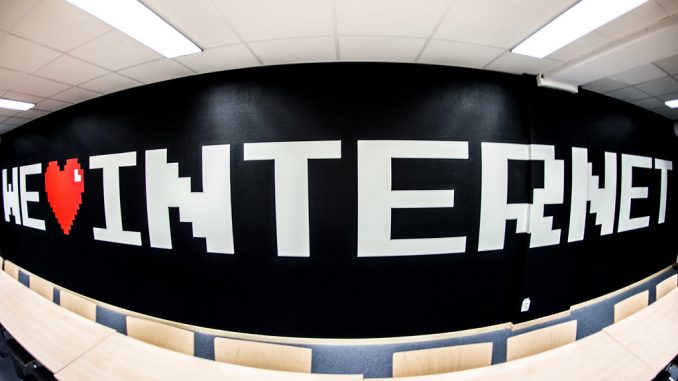

“We love Internet” by Kalexanderson is licensed under CC BY 2.0
Internet preserves the structural inequalities of the past
With the development of the Internet, it is gradually improved. However, Internet at present is still affected by the previous and still retains structural inequality. Internet culture still retains the prejudice of the 1960s. From the 1960s to the present, most Internet communities were dominated by men or whites (Lusoli, & Tuner, 2014). The Internet is still shaped by the culture of the past by gender inequality and racial inequality. This shows that the development of the Internet has not been changed by these inequalities. Most individuals are involved in the construction of the Internet. Nevertheless, the Internet is gradually increasing social class inequality and racial inequality in different ways. For example, Internet companies increase social inequality through monopoly. Furthermore, the inconsistency between the masses and the media elite in obtaining information on the Internet leads to the inequality of social class. In addition, The Internet has also exacerbated racial inequality through the algorithm deviation of search engines and the use of artificial intelligence.
The Internet reinforces structural inequality

“Google” by Cesar Solorzano is licensed under CC BY-NC-ND 2.0
Some Internet enterprises increase social class inequality by monopolizing the market. The Internet is a product produced by high-tech companies or Internet enterprises. Some well-known Internet companies try to monopolize the Internet market through lobbying or other methods. The majority of media companies use lobbying teams to protect their interests in the market. In this case, the lobbying team plays a very significant role in the company. Now more and more well-known Internet companies are hiring many lobbying teams and participating in policy talks (Popiel, 2018). In order to protect interests of companies, this behavior has been very common. For example, Google has hired a lot of lobbying on competition issues. In this situation, the supervision attention will shift from competition problem to other business issues of the company (Popiel, 2018). Google is not willing to be regulated because it monopolizes the search engine market. Therefore, Google employs more lobbying to avoid the problem of regulated competition. Google consolidates its monopoly on the market for its own interests at any cost and maximize the economic benefits (Noble, 2018). Lobbying teams can influence the formulation of media legislation and policies to increase the rights of their own companies. At the same time, it influences the legislature through its own rights to formulate laws and policies conducive to the company (Popiel, 2018). In this instance, many large enterprises can spend the large number of monies on lobbying. Network enterprises can obtain benefits and reduce disadvantages through the power of lobbying. The majority of internet companies keep their monopoly position through the exclusive right to lobby (Popiel, 2018). However, the well-known large companies hired the large number of lobbying through the advantage of capital to monopolize the market. In this case, it is difficult for small companies to compete with technology companies with numerous lobbying. Therefore, the monopolistic behavior of these large internet companies has exacerbated social class inequality.

“Fake News” by wuestenigel is licensed under CC BY 2.0
Internet enterprises control the information on the Internet through their own power. This leads to inconsistent information received by the public and other media elites. In this case, the Internet increases social class inequality. Among Internet enterprises, Google search engine is the most familiar to the public. The public can find useful information by using Google search engine. However, with the development of the Internet, a large number of fakes news appear in the vision of the public. Google uses its monopoly power in the market to give priority to displaying web search results according to different topics (Noble, 2018). In this situation, users can only search what Google wants the public to know. There is only a small chance that the public will know the truth about what Google does not want to show to the public. The ACCC criticized the market forces of Google and Facebook. It considered that Google and Facebook are using their monopoly power to bring bad influences the news media and advertising firms (Flew, 2019). Monopolistic position of google in the market makes it without competitive pressure. In other words, the establishment of the Google being for huge advertising benefits, not for the public to provide a free search engine. Therefore, Google can control whether information appears on the Internet through its monopoly position on the Internet. In this situation, these Internet companies are not just Google that can give individuals access to inaccurate or false information. The public can only know some information that is not true by searching the Internet. But these internet companies can obtain information that they want to hide from the public, so that the public and the media elite have unequal access to information in society. In general, the Internet has increased social class inequality.

“Compassion through Computation: Fighting Algorithmic Bias” by World Economic Forum is licensed under CC BY-NC-SA 2.0
With the development of the Internet, the search engine algorithm bias and artificial intelligence on the Internet also contribute to racial inequality. When users search for the term “black” through Google, the search ranking is information unfavorable to black individuals (Noble, 2018). When users search for such black topics, Google automatically recommends information that is less conducive to racial harmony. In this case, Google is reinforcing the perception of the public racism through its associative ranking of search engine. Also, the algorithm of Google does not produce the same results for different races. Black race search results are unfriendly in Google search engine. Hence it clearly shows that algorithm of Google is racist. In addition, racial discrimination exists not only in algorithm bias, but also in artificial intelligence. An artificial intelligence machine called Northpointe helps judges in court decide whether criminals will break the law in the future.

“AI Algorithms Bias Blackout Poem” by Dogtrax is licensed under CC BY-SA 2.0
The judgment of Northpointe led to excessive imprisonment of black criminals. But when tested on white criminal who seemed prone to reoffending, Northpointe assumed that white criminal would not commit crimes in the future (Noble, 2018). From this point of view, the groundless judgment of artificial intelligence software of black criminals is unfair. Northpointe, an artificial intelligence software, also has racial discrimination against blacks. As the world develops, artificial intelligence will gradually increase. When the AI system exists racist, it will increase the perception of public of racism. In general, search engine and artificial intelligence are the products of the Internet. Both search engines and artificial intelligence have prejudice and stereotype against black race. In this case, the behavior of the Internet will increase the prejudice of public against black race and increase the inequality of race.
Conclusion
In conclusion, the development of the Internet has not completely eliminated social class and racial inequality. Famous Internet companies increase social class inequality through unique rights. Moreover, Internet companies hide information for profit, making access of users to information unequal. In addition, there is racial bias in Internet search algorithms and artificial intelligence. In this case, it will increase ideas of individuals of racial discrimination. Therefore, the Internet needs to be regulated to eliminate these inequalities. However, regulating the Internet is a difficult problem. Many regulations have little effect in regulating the Internet (Flew et al., 2019). In this situation, the government needs to introduce some effective laws to regulate the deficiencies of the Internet, such as market monopoly and racial discrimination. Meanwhile, Internet enterprises need to cooperate with the government for strict self-discipline and management. In this way, the development of the Internet can become better, and the phenomenon of inequality will gradually decrease in the Internet.
Reference List
Flew, T (2019), ‘Guarding the Gatekeepers: Trust, Truth and Digital Platforms’, Griffith Review 64, pp. 94-103.
Flew, T., Martin, F., & Suzor, N. (2019). Internet regulation as media policy: Rethinking the question of digital communication platform governance. Journal of Digital Media & Policy, 10(1), 33–50. https://doi.org/10.1386/jdmp.10.1.33_1
Lusoli, A., & Turner, F. (2021). “It’s an Ongoing Bromance”: Counterculture and Cyberculture in Silicon Valley—An Interview with Fred Turner. Journal of Management Inquiry, 30(2), 235–242. https://doi.org/10.1177/1056492620941075
Noble, S. (2018). A society, searching. Algorithms of Oppression: How Search Engines Reinforce Racism (pp.15-63). New York, USA: New York University Press. https://doi.org/10.18574/9781479833641-003
Popiel, P. (2018). The Tech Lobby: Tracing the Contours of New Media Elite Lobbying Power. Communication, Culture & Critique, 11(4), 566–585. https://doi.org/10.1093/ccc/tcy027